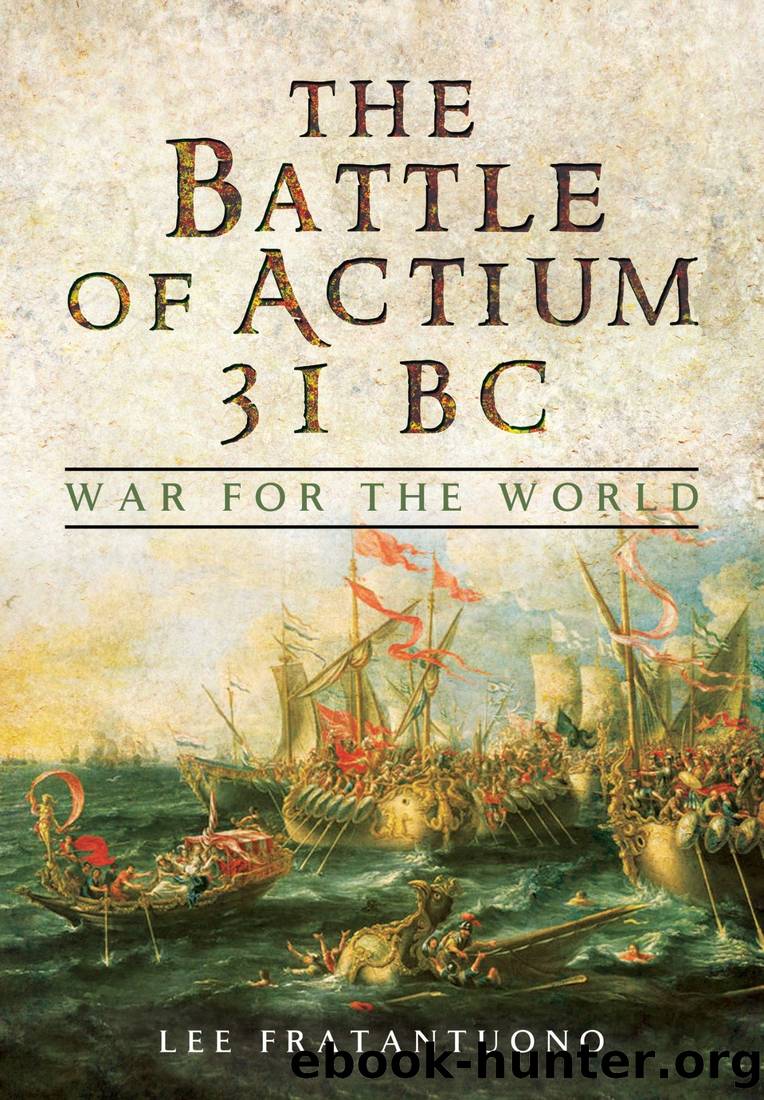The Battle of Actium 31 BC: War for the World by Lee Fratantuono

Author:Lee Fratantuono [Fratantuono, Lee]
Language: eng
Format: epub
Tags: History, Military, Ancient, Rome
ISBN: 9781473847149
Google: 0iAzEAAAQBAJ
Amazon: 1473847141
Publisher: Pen and Sword Military
Published: 2016-07-30T18:30:00+00:00
Ghosts of Troy.
Famously, at this point in the Virgilian narrative, Camilla is distracted by the appearance of the Trojan Chloreus, a devotee of the goddess Cybele (11.768 ff.). When Camilla was first introduced in Book 7, she was described as resplendent in purple as well as gold (we might think of the significance of those two colours to Cleopatra at Actium); now she sees the purple and gold of the lavishly dressed Chloreus, and is momentarily in doubt as to what she should do, the question being whether the arms of Chloreus should be displayed in a temple as spoils of war, or worn by Camilla herself as part of a rich set of apparel. And Virgil is clear enough that Camilla has a very feminine love of spoils and plunder, femineo praedae et spoliorum ardebat amore (11.782).
Here we may well see an evocation of the image of Cleopatra in her lust for wealth, indeed of Cleopatraâs interest in treasure and the safeguarding thereof. Arruns makes his prayer to Apollo, and Camilla is fatally wounded. It is clear enough from the unfolding of the epic account that both Jupiter and Apollo are involved in the doom of Camilla, and her own confusion over what to do with the arms of Chloreus is part of the drama, indeed a key element. Chloreus is depicted as either a priest or a former priest of the goddess Cybele, a deity whose worshippers included castrated devotees, eunuch adorers of the immortal of the Trojan Mount Ida. The worship of Cybele and the fanatic rites of her followers stand rather in sharp contrast to the sober traditions of Italy and Roman religious practice. Camilla is distracted by a devotee of the Trojan mother goddess, and Apollo ultimately sees to her death, an appropriate blend of the old gods and the new in defence ultimately of the Troy that is destined to be reborn, after a fashion at least, as the new Rome. Camilla does not entirely understand what she is looking at as she sees the strangely attired Chloreus, but she does have an unquestionable attraction to, and fascination with his luxurious, splendid raiment. The precise meaning of such phrases as femineo amore has exercised the talents of Virgilian commentators, but the sentiment could just as easily be applied to Cleopatra as to her Volscian avatar.
For the larger Virgilian narrative, the main point behind the divine interventions in the matter of Camilla, the immortal actions of both Jupiter and Apollo (the latter god significant from the Actian perspective), is the effect her death has on Turnus. In a strict sense, if Turnus had maintained his ambush, Aeneas would have been severely handicapped, perhaps even killed. Camilla has final instructions for Turnus before she breathes her last; she conveys them to her trusted companion Acca (who is either the same as the aforementioned Larina, or a hitherto unmentioned character). She instructs Turnus, via Acca, that he should succeed her in the battle, and ward off the Trojans from the city (11.
Download
This site does not store any files on its server. We only index and link to content provided by other sites. Please contact the content providers to delete copyright contents if any and email us, we'll remove relevant links or contents immediately.
| Africa | Americas |
| Arctic & Antarctica | Asia |
| Australia & Oceania | Europe |
| Middle East | Russia |
| United States | World |
| Ancient Civilizations | Military |
| Historical Study & Educational Resources |
Never by Ken Follett(2873)
The Man Who Died Twice by Richard Osman(2291)
Machine Learning at Scale with H2O by Gregory Keys | David Whiting(2269)
Fairy Tale by Stephen King(2059)
Will by Will Smith(2033)
Rationality by Steven Pinker(1761)
The Dawn of Everything: A New History of Humanity by David Graeber & David Wengrow(1566)
The Dark Hours by Michael Connelly(1564)
Principles for Dealing With the Changing World Order: Why Nations Succeed and Fail by Ray Dalio(1368)
Friends, Lovers, and the Big Terrible Thing by Matthew Perry(1324)
A Short History of War by Jeremy Black(1295)
HBR's 10 Must Reads 2022 by Harvard Business Review(1251)
Go Tell the Bees That I Am Gone by Diana Gabaldon(1231)
Can't Hurt Me: Master Your Mind and Defy the Odds - Clean Edition by David Goggins(1223)
515945210 by Unknown(1205)
Fear No Evil by James Patterson(1106)
443319537 by Unknown(1070)
Works by Richard Wright(1017)
Going There by Katie Couric(989)
